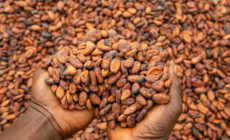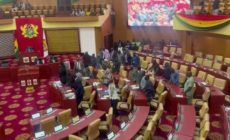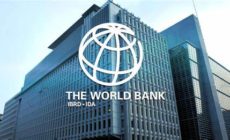World Bank cautions Ghana against its rising debt
- Posted on
- Comment
 The World Bank has cautioned Ghana against its rising debt, which it says has the tendency to stifle the country’s economic growth and deepen poverty.Ghana’s debt currently stands at GHc43.9 billion (49.5 per cent of Gross Domestic Product (GDP)) at the end of August 2013.
The World Bank has cautioned Ghana against its rising debt, which it says has the tendency to stifle the country’s economic growth and deepen poverty.Ghana’s debt currently stands at GHc43.9 billion (49.5 per cent of Gross Domestic Product (GDP)) at the end of August 2013.
Presenting the economic strides for countries in the African sub-region at a teleconference beamed from Washington in the United States of America (USA) to Accra, the Deputy Regional Chief Economist of the World Bank Africa Region, Mr Francisco Ferreira, attributed Ghana’s rather high financial deficit to an increase in the country’s infrastructure development and pro-poor programmes.
The economy of Ghana is still facing liquidity challenges, with both revenue receipts and expenditure falling below their targets, nine months into the year.
The only exception is compensation for workers, which has overshot its target by 2.2 per cent, but Mr Diop indicated that the country could take charge of the situation if it improved its macroeconomic output.
Africa growth rate impressive
Contributing to the conference, the Lead Economist of the World Bank Africa Region, Ms Punam Chuhan-Pole, said with the exception of South Africa, countries in the sub-region were doing well.
South Africa’s economic growth, according to her, was two per cent.
Ms Chuhan-Pole is also the author of ‘Africa’s Pulse’, a twice-yearly publication which analyses issues shaping Africa’s economic prospects.
Africa’s economic growth was projected to surge 4.9 per cent this year, but the bank said some were growing at an impressive six per cent.
“Currently, almost a third of countries in the region are growing at six per cent and more and African countries are now routinely among the fastest-growing countries in the world,” she said.
Growth not impacting poverty reduction
Despite that growth, poverty in the sub-region, the World Bank indicated, was still high, with almost one in every two Africans living in extreme poverty.
“As Africa’s growth rates continue to surge, with the region increasingly a magnet for investment and tourism, ‘Africa’s Pulse’ notes that poverty and equality remain unacceptably high and the pace of reduction unacceptably slow,” she said.
The World Bank is optimistic that the poverty rate is likely to fall to between 16 and 30 per cent by 2030.
‘Africa’s Pulse’ reports, however, suggested that by 2030 most of the world’s poor people would be living on the African continent.
Graphic










 (Selorm) |
(Selorm) |  (Nana Kwesi)
(Nana Kwesi)